人教新课标英语选修十Unit 4 Learning efficiently (全单元教案)
文档属性
| 名称 | 人教新课标英语选修十Unit 4 Learning efficiently (全单元教案) |
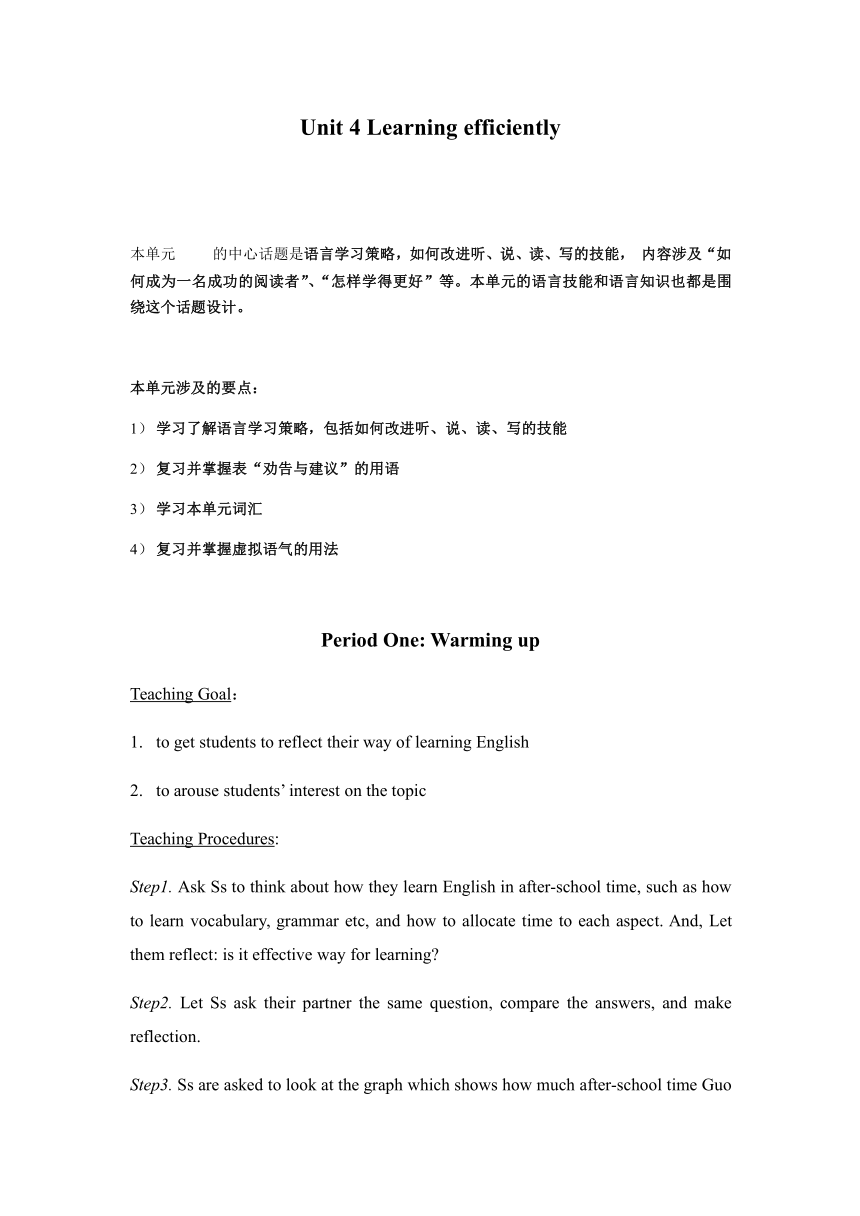
|
|
| 格式 | zip | ||
| 文件大小 | 78.0KB | ||
| 资源类型 | 教案 | ||
| 版本资源 | 人教版(新课程标准) | ||
| 科目 | 英语 | ||
| 更新时间 | 2019-12-08 00:00:00 | ||
图片预览

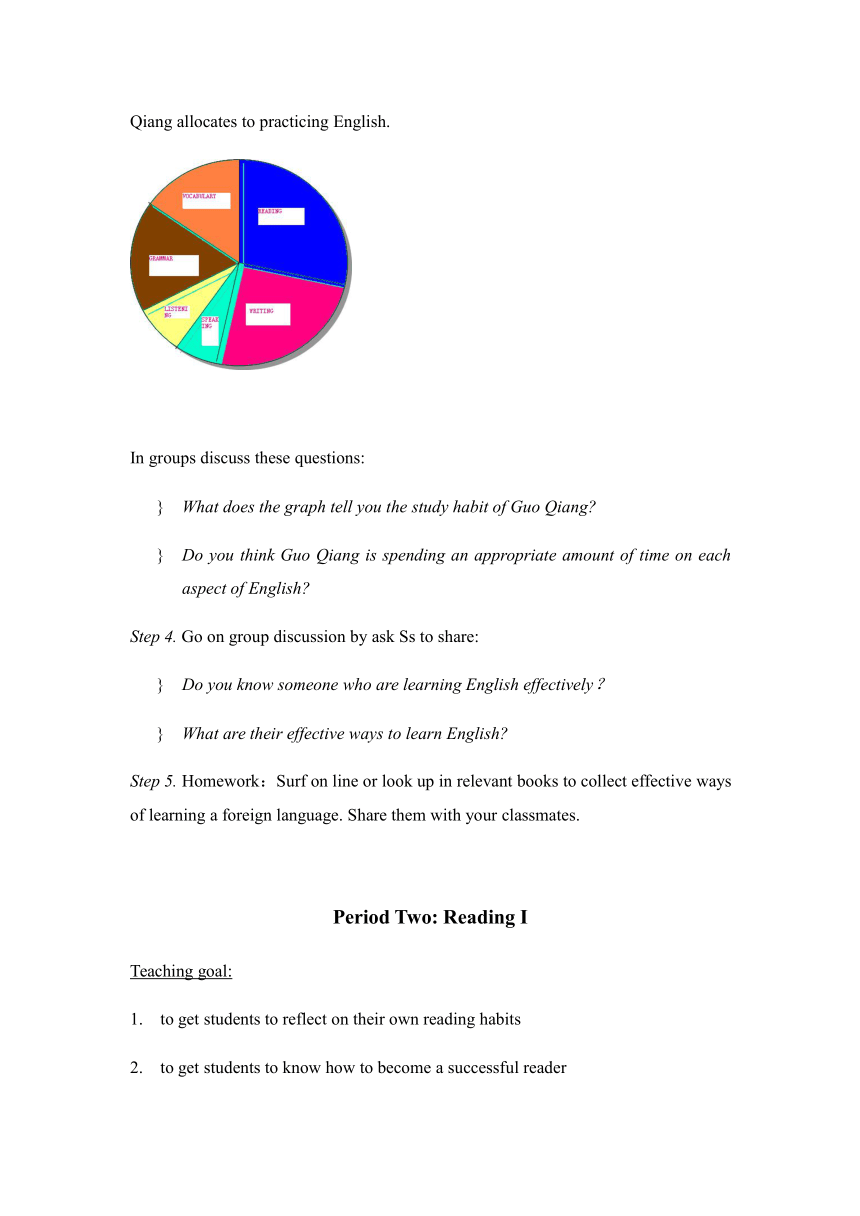
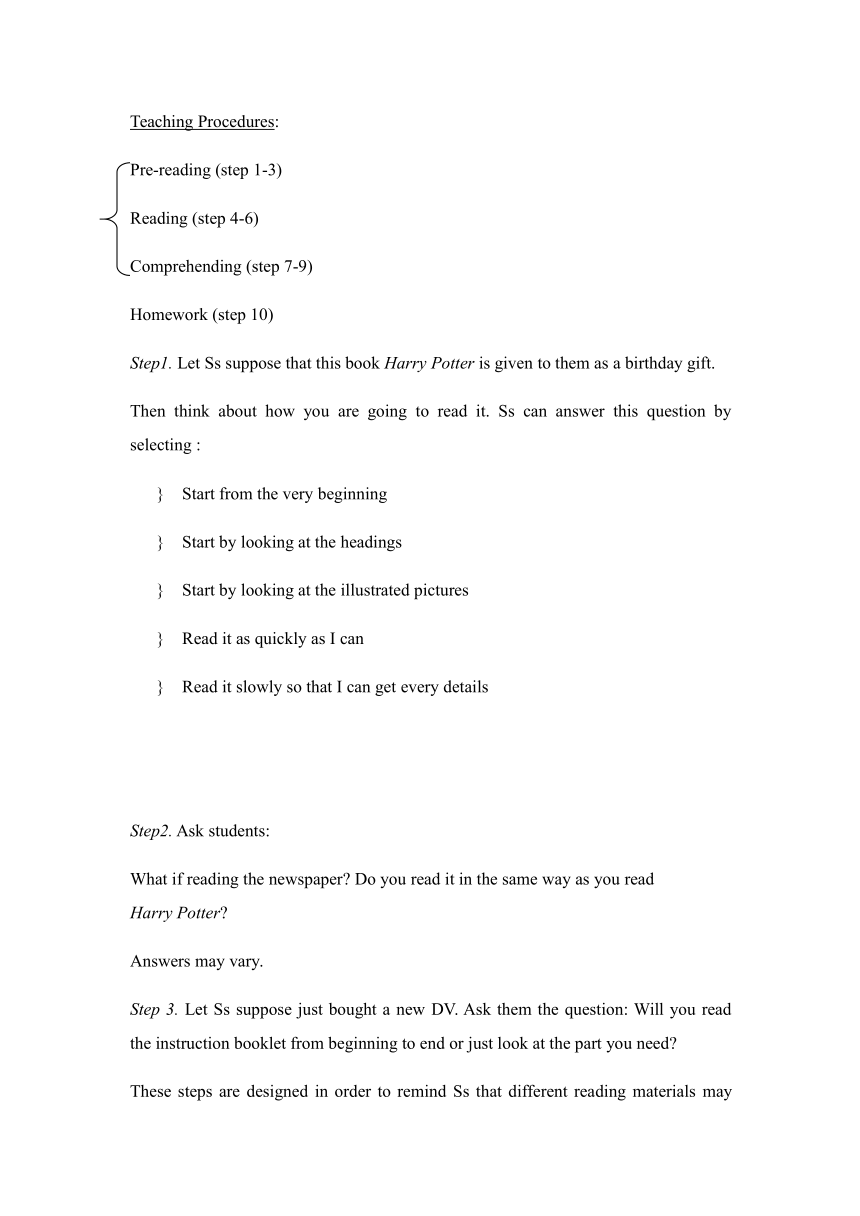
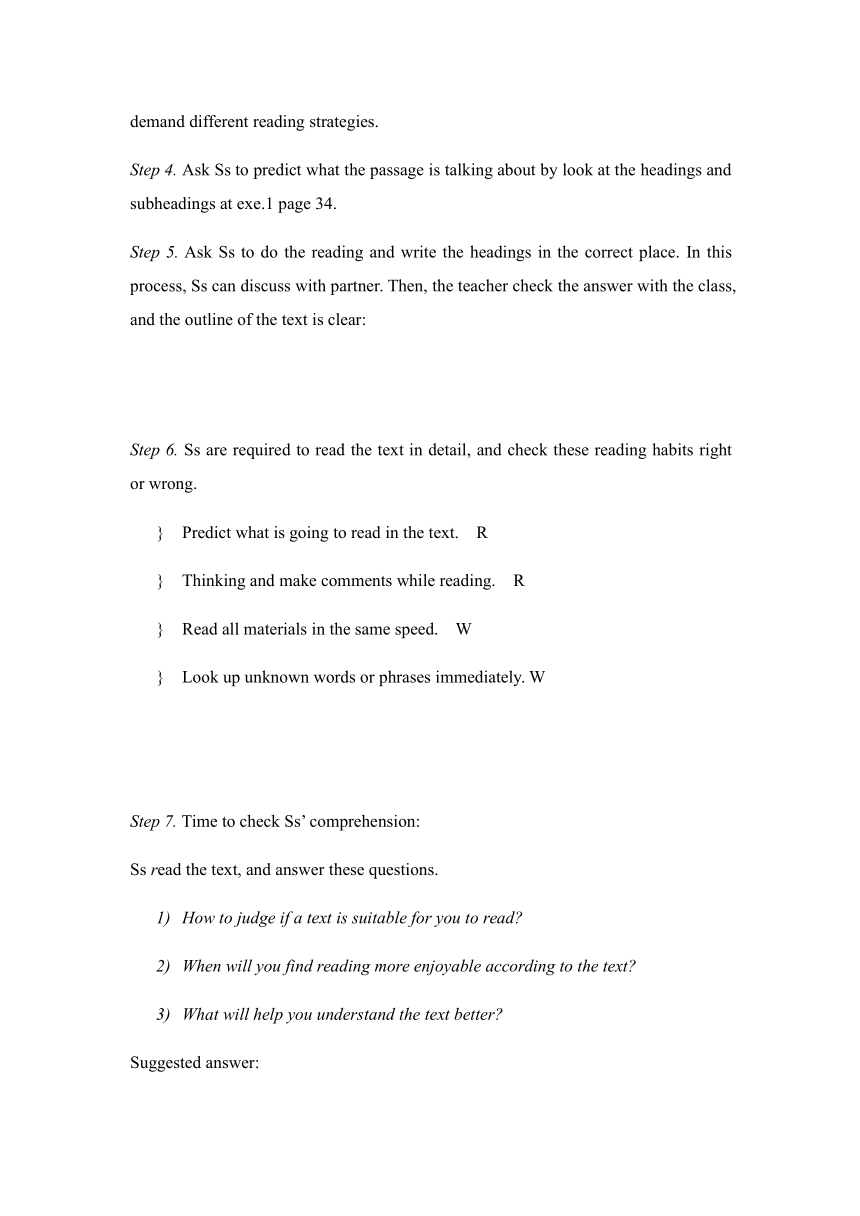
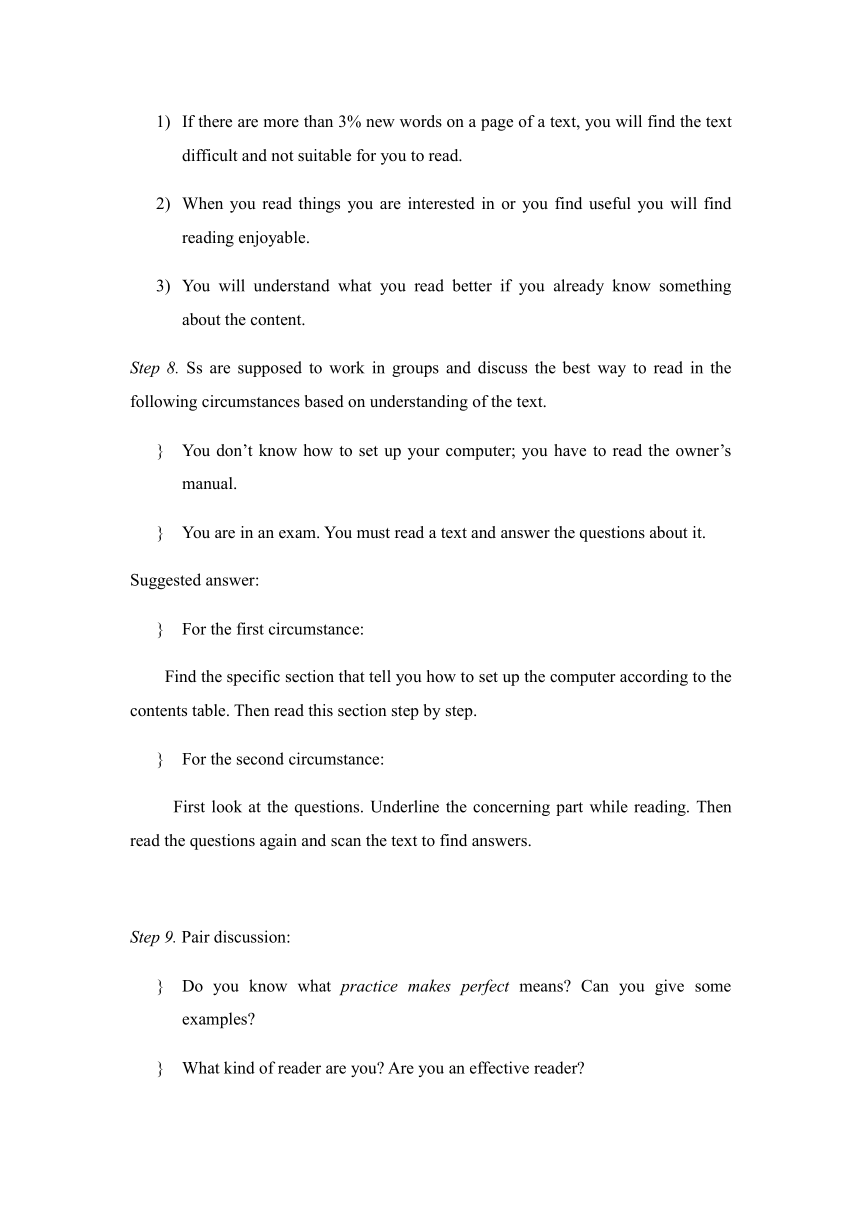
文档简介
Unit 4 Learning efficiently
本单元的中心话题是语言学习策略,如何改进听、说、读、写的技能, 内容涉及“如何成为一名成功的阅读者”、“怎样学得更好”等。本单元的语言技能和语言知识也都是围绕这个话题设计。
本单元涉及的要点:
1) 学习了解语言学习策略,包括如何改进听、说、读、写的技能
2) 复习并掌握表“劝告与建议”的用语
3) 学习本单元词汇
4) 复习并掌握虚拟语气的用法
Period One: Warming up
Teaching Goal:
1. to get students to reflect their way of learning English
2. to arouse students’ interest on the topic
Teaching Procedures:
Step1. Ask Ss to think about how they learn English in after-school time, such as how to learn vocabulary, grammar etc, and how to allocate time to each aspect. And, Let them reflect: is it effective way for learning?
Step2. Let Ss ask their partner the same question, compare the answers, and make reflection.
Step3. Ss are asked to look at the graph which shows how much after-school time Guo Qiang allocates to practicing English.
In groups discuss these questions:
? What does the graph tell you the study habit of Guo Qiang?
? Do you think Guo Qiang is spending an appropriate amount of time on each aspect of English?
Step 4. Go on group discussion by ask Ss to share:
? Do you know someone who are learning English effectively?
? What are their effective ways to learn English?
Step 5. Homework:Surf on line or look up in relevant books to collect effective ways of learning a foreign language. Share them with your classmates.
Period Two: Reading I
Teaching goal:
1. to get students to reflect on their own reading habits
2. to get students to know how to become a successful reader
Teaching Procedures:
Pre-reading (step 1-3)
Reading (step 4-6)
Comprehending (step 7-9)
Homework (step 10)
Step1. Let Ss suppose that this book Harry Potter is given to them as a birthday gift.
Then think about how you are going to read it. Ss can answer this question by selecting :
? Start from the very beginning
? Start by looking at the headings
? Start by looking at the illustrated pictures
? Read it as quickly as I can
? Read it slowly so that I can get every details
Step2. Ask students:
What if reading the newspaper? Do you read it in the same way as you read
Harry Potter?
Answers may vary.
Step 3. Let Ss suppose just bought a new DV. Ask them the question: Will you read the instruction booklet from beginning to end or just look at the part you need?
These steps are designed in order to remind Ss that different reading materials may demand different reading strategies.
Step 4. Ask Ss to predict what the passage is talking about by look at the headings and subheadings at exe.1 page 34.
Step 5. Ask Ss to do the reading and write the headings in the correct place. In this process, Ss can discuss with partner. Then, the teacher check the answer with the class, and the outline of the text is clear:
Step 6. Ss are required to read the text in detail, and check these reading habits right or wrong.
? Predict what is going to read in the text. R
? Thinking and make comments while reading. R
? Read all materials in the same speed. W
? Look up unknown words or phrases immediately. W
Step 7. Time to check Ss’ comprehension:
Ss read the text, and answer these questions.
1) How to judge if a text is suitable for you to read?
2) When will you find reading more enjoyable according to the text?
3) What will help you understand the text better?
Suggested answer:
1) If there are more than 3% new words on a page of a text, you will find the text difficult and not suitable for you to read.
2) When you read things you are interested in or you find useful you will find reading enjoyable.
3) You will understand what you read better if you already know something about the content.
Step 8. Ss are supposed to work in groups and discuss the best way to read in the following circumstances based on understanding of the text.
? You don’t know how to set up your computer; you have to read the owner’s manual.
? You are in an exam. You must read a text and answer the questions about it.
Suggested answer:
? For the first circumstance:
Find the specific section that tell you how to set up the computer according to the contents table. Then read this section step by step.
? For the second circumstance:
First look at the questions. Underline the concerning part while reading. Then read the questions again and scan the text to find answers.
Step 9. Pair discussion:
? Do you know what practice makes perfect means? Can you give some examples?
? What kind of reader are you? Are you an effective reader?
Step 10. Homework: Make a poster advising students how to improve reading skills.
Share it with your classmates.
Period Three: Learning About Language
(Language points & exercise)
Teaching Goal:
1. to sum up the new language points for students
2 to review the subjunctive mood
3 to enable students to grasp the language points through exercise
Teaching Procedures:
Step 1. New words and expressions
1) allocate
vt.分配,分派,把…拨给
allocate funds for new projects
为新计划拨出经费
You should allocate the same amount of time to each question.
你应该对每个问题分配相同的时间。
2) competent ?
a.有能力的,能胜任的
a highly competent driver 技术高超的司机
He is competent enough to fill that position.
他足以胜任那职位。
She was slim and blonde and pretty, and also unmistakably competent.
她身段苗条,金发,漂亮,而且非常能干
3) up to ?
取决于, 有责任
It's up to you to decide.
由你决定
It's up to us, who are the dominant people, to watch out.
我们是占统治地位的人,我们有责任提高警惕
另外,up to 还有“直到、能胜任”的意思。如:
Up to now, everything is all right.
到目前为止,一切都很好。
He is not up to his work.
他不胜任工作。
4) caption
n.(图片)说明文字,(电影)字幕
Here is a caption under the picture.
图片下边附有说明。
5) frequent ?
a.时常发生的,频繁的,常见的
He is a frequent visitor to our house.
他是我们家的常客。
It's necessary for leading cadres to keep frequent contacts with the masses.
领导应和群众经常见面。
近义词:repeated, often, time and time again
Step2. Review the subjunctive mood
I. 虚拟语气在条件句中的三种情况
1. 表示“不太可能出现的情况”:从句一般过去时,主句用would/should /could/might do.
如:If I were you, I would accept the offer.
I should be surprised if I was less than five pounds.
2. 表示“本可能发生却没有发生的事情”:从句用过去完成时,主句用would/ should/ could / might have done.
如:If he had taken the doctor’s advice, he might not have died so soon.
3. 表示 “将来不太可能出现的情况”:从句用 should do,were to do, 主句用would/should /could/might do.
如:If it should rain tomorrow, the sports meet would have to be put off.
II.虚拟语气用于 I wish的宾语从句中
? 表现在: 动词用一般过去时和过去进行时
? 表过去:动词用过去完成时和过去完成进行时
? 表将来:动词用 would/could do.
例如:
I wish he weren’t so lazy.
I wish they could have come to my party.
I wish everything would be as quiet as before.
III. It is (high) time 从句中
表示“该做而没有作的事情”,动词用一般过去时。
如:
It’s the high time we began to work.
It’s the high time we went home.
IV. 表示“建议、要求、命令”动词的宾语从句中
这些动词有:ask advise command insist demand require suggest order propose decide urge
这些词从句谓语用虚拟语气 should do ,should 可省略。
例如:
He insisted that John should do this job.
The union demanded the wage be raised by 20%.
We suggested the meeting not be postponed.
Step 3. Exercise
1. Word practice: Ask Ss to do exe1, page 35 on textbook, and the teacher checks the answer with the class.
2. Subjunctive mood practice:
1) If you _____ to see Sara, what would you tell her?
A. are B. will be going
C. had D. were
2) If I ____ harder at school, I would be sitting in a comfortable office now.
A. had worked B. worked
C. had been working D. were working
3) I wish I ____ this morning, but I had to get up and come to class.
A. could have slept
B. slept
C. might have slept
D. have slept
4) “You are very selfish. It’s high time _____ you are not the most important person in the world.” Edgar said to his boss angrily.
A. have realized
B. realized
C. realize
D. should realize
5) ____ for my illness, I would have lent him a helping hand.
A. Not being
B. Had it not been
C. Without being
D. Not having been
Step 4 . Homework : Do exercises on your workbook.
Period Four: Reading II
Teaching Goal:
1. to get Ss familiar with the three learning types
2. to get students prepared for use of language (listening , speaking and writing)
Teaching Procedures:
Step1. Pre-reading (Pair Work)
Ask Ss to discuss these questions with partner:
1. When you have a list of new words to learn, what do you do about learning them?
2. What do you think is the best way to learn grammar?
3. In what situation do you think your English would improve most? Live with native speakers? Watch English movies? Study the textbook?
Ss can compare their answer, and find different ways of learning exist.
Step2. Ask Ss to do the questionnaire on page 36-37 to find out what kind of learner you are. Before doing , some tips are given:
? Only tick the ones that apply to you
? Do not spend too long on each statement, but to tick the ones that you immediately as you read them.
Step3. After Ss finishing doing the quiz, let them refer to the table to find out which kind of learner you are—visual, auditory, or tactile?
Step 4. Discussion: Report to group member what kind of learner you are according to the quiz, then, do you agree or disagree with the result?
Step 5. Ss are supposed to read the passage on the next page to find out How do you learn best. And list the proper activities to learn vocabulary for the three types of learners.
Step6. Homework. Ss are required to do exercises on your workbook.
Period Five: Using Language
Teaching Goal:
To enable Ss to use what they’ve learned in daily communication by focusing on listening, speaking and writing.
Teaching Procedures:
Step1. Started with a brief review of what have last in last session by asking Ss to discuss:
What are the characteristics of a tactile learner?
What things can you think to help such a leaner practice reading?
Step2. Ss are asked to listen to the tape, and note down the three things Yufang and Annie advise Xiaozhou to do.
Suggested answer:
Step3.Listen again and answer the questions in exe 3 on page 38.
Step4. Group discussion:
What do you think their advice? Are they good or not?
What aspect of English you find most difficult? Ask your group members to give you helpful advice.
Useful expressions are given to Ss in case they use in their discussion:
Step5. Reading and writing. In this part, Ss are supposed to write an answer e-mail after reading the received one.
First, Ss read Donhua’s e-mail on page 39, and find out: 1) the purpose of this e-mail 2) what problems Donhua has
Step 6. Let Ss to think about suggestions for Donhua’s problems and write them down.
Step7. Ss are supposed to write an e-mail following this pattern:
Step 8. Homework. The writing is left as a homework which Ss are supposed to finish it at home and bring and share it in the next class.
You should…
Why don’t you …?
It’s worth a go.
I could see if it helps.
I’ve thought of something you could do.
